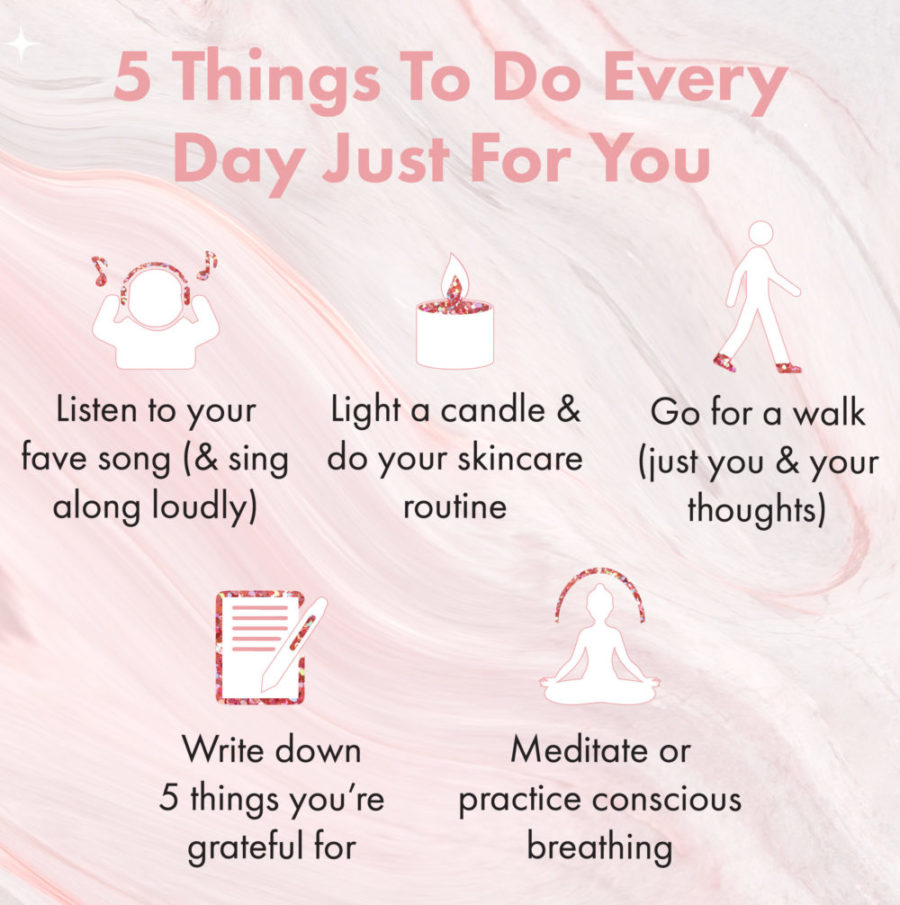Stressed? Overwhelmed? Here's How (& Why) Self-Care Will Help

Self-care: two little words that have been echoed around the world relentlessly over the past two years for obvious reasons – we’ve needed it more than ever. And while you’ve probably seen countless Instagram stories mentioning the topic and telling you to “schedule in self-care,” it can (ironically) be an overwhelming topic for so many people. Like, what does it really mean?! (Stay tuned!)
In honor of Self Care Awareness Month, we’re sharing some facts on what self-care is, different self-care rituals, and our tips for curating the ultimate self-care routine. A routine you can turn to whenever, whether you’re traveling, stuck at home, or even at work! Over the past few years, Huda Beauty HQ has prioritized self-care more than ever before, and as a result, we’ve all benefitted. So, we want to share everything we’ve learned with you, our HB family.
What is Self-Care?
The bottom line is: self-care means something different to everyone. To some, it may mean a facemask, hot bath, and a glass of wine, while for others, it may be a workout class and weekly therapy.
Officially, World Health Organization defines it as “The ability of individuals, families, and communities to promote health, prevent disease, maintain health, and to cope with illness and disability with or without the support of a healthcare provider.”
In simpler terms, self-care is the conscious act and effort taken to promote and nurture your own physical, mental, and emotional well-being. Need receipts? Research suggests self-care promotes positive health outcomes, such as developing physical and mental resilience, living longer, and better managing stress.

If you’re asking, “okay, but what actually is self-care?” Essentially it means doing something for you that makes you feel good. However, there are so many forms of self-care, which typically fall into five categories: physical, social, mental, emotional, and spiritual.
Today, we’re giving you a debrief on each type of self-care, why it’s beneficial, and some examples you can work into your own self-care routine.
Physical Self-Care
 via Giphy
via Giphy
While the topic of physical self-care may seem obvious – eating a balanced diet and exercising regularly – there’s a lot more than meets the eye. Not only is it important to nourish your body with the right food and get moving daily, but you also need to listen to your body’s individual needs and respond in a way that allows you to feel your best. For example, different people respond to exercise differently, so while you may feel that rush of endorphins after a spin class, another person may benefit more from low-impact workouts like yoga or pilates. Finding what works for you is at the very heart of self-care.
 via Giphy
via Giphy
Sleep is another huge area of self-care that has been getting a lot of attention, as without sleep, you’re more likely to feel anxious, overwhelmed, and stressed. It’s even linked to an increased likelihood of serious health conditions like heart disease. To improve your sleeping habits, check out a sleep expert’s guide to better sleep.
For some of us, physical self-care could mean listening to your menstrual cycle and optimizing your schedule around your hormonal highs and lows. This is called cycle syncing, and trust us, it’s life-changing.
 via Giphy
via Giphy
As you’d expect, our daily beauty routine is an integral part of our self-care routine as it helps us look and feel our best. Plus, the repetitive motions and routine are proven to help regulate your mood – the familiarity is grounding and calming. During the pandemic, and even now, applying our skincare and makeup has become an integral part of our self-care routine.
If you’re still looking for inspo, here are some other physical self-care rituals you can try:
Physical Self-Care Examples:
- Daily walks or weekend hikes with a good podcast or with a friend
- An exercise class: whether it’s yoga, pilates, spin, or hit
- Prioritizing healthy sleep habits and ensuring we get the recommended 7-9 hours sleep a night
- Cooking a nutritious meal and prepping meals for the week ahead
- Stretching after a long day
- A hot bath to relax or soothe aching muscles
- Our morning and evening beauty routine
- DIY scalp massage
- Booking a facial or doing our own DIY facial at home
Mental and Emotional Self-Care
 via Giphy
via Giphy
Looking after your mental and emotional health should be one of your main priorities, as it can have a serious impact on your overall well-being. Particularly now, when our mental health has taken a massive hit during the pandemic. From feelings of stress and anxiety to depression, mental self-care will help you self-soothe, so you’re in control of your emotions. Self-care can also help you form a proactive path out of these darker moods or spells. In more serious cases, it can involve seeking out professional health or simply taking the time to meditate and journal every day.
Pro tip: journaling is actually one of our fave self-care rituals that we practice each morning. It’s also great whenever you’re feeling a little overwhelmed – simply put pen to paper and write down all of your thoughts.
Practicing gratitude is another self-care ritual that’s proven to boost your mental and emotional state. In fact, one study reveals that it’s been shown to reduce depression and increase happiness, while another study showed that it reduced aggression and increased empathy. So, while you’re enjoying your cup of hot lemon water in the morning, or perhaps when you’re showering, think of three things you’re grateful for; it can be anything from your partner to your morning coffee.
When considering your mental and emotional well-being, it’s also important to consider what your mind absorbs every day and how it makes you feel. For example, think about your social media intake every day. Does entering the app leave you critical of your life and your appearance? Or does it leave you feeling creatively inspired and empowered? Ask yourself this question regularly, and Marie Kondo (clean up) your social media accordingly. Self-care is more important!
Mental Self-Care Examples:
- Therapy sessions with a licensed professional
- Daily meditation using an app – we love the Calm app and the Wim Hoff Breathing technique
- Journaling every day for 10 minutes morning and/or night
- Practicing gratitude every morning and/or night
- Listening to music, which helps us feel relaxed. In fact, we have a dedicated playlist that we turn to whenever we’re feeling stressed. It doesn’t need to be chilled; put your fave song on and dance and sing along to it!
- A 24-hour social media detox
- Unfollowing all the people on Instagram that don’t make us feel good
Posts You'll Love:
Social Self-Care
 via Giphy
via Giphy
Human connection is an essential part of self-care – something we’ve realized more than ever amidst a global pandemic. Forming close connections and maintaining friendships provides us with a huge amount of happiness, validation, and stability. And while sharing your thoughts and feelings with others may seem difficult, try to go to someone you can trust as the physical act of speaking your problems into existence is not only cathartic, but it allows you to gain perspective. In fact, research from U.C.L.A. suggests that putting your feelings into words – a process called “affect labeling” – can diminish stress-driven reactions allowing you to think more clearly.
Social Self-Care Examples:
- Scheduling regular calls with loved ones
- Meeting a friend in person to catch up
- Sending your bestie a text to remind them how special they are
- Reconnecting with an old friend
Spiritual Self-Care
 via Giphy
via Giphy
Spiritual self-care is another hot topic, RN. While it’s also a topic that’s met with a lot of skepticism, research shows that a lifestyle including religion or spirituality is generally a healthier lifestyle.
However, engaging in spirituality doesn’t have to include religion or astrology; it can be anything that helps you develop a deeper sense of self or connect with the universe. For some, that could be connecting with crystals, and for others, it simply means immersing yourself in nature.
Spiritual Self-Care Examples:
- Meditation
- Healing with crystals
- Surrounding yourself with nature
- Religious prayer
-
Volunteering to help your community
- Manifestation
How to Create a Self-Care Routine
 via Giphy
via Giphy
There’s no one-size-fits-all when it comes to self-care, so finding what works for you is essential. Luckily, it’s normally a very rewarding process.
To get a sense of what self-care rituals you should prioritize, ask yourself when you feel most calm, grounded, and happy. Is it after a long hot bath or meeting a friend for coffee? What part of your routine feels as if you’re filling your mental, emotional, and physical cup rather than emptying it? Take note of these activities, however big or small.
When compiling your self-care routine, jot down your fave activities into your journal. Then after a few weeks, curate a routine out of these activities. It’s helpful to have a routine that’s flexible and doesn’t rely too heavily on one element so you can lean on it in times of need. For example, if music is key to your self-care routine, a good playlist that you can listen to regularly is ideal.
In addition to this, we also like to schedule weekly rituals that help us feel our best. Here’s a quick example of our self-care routine that we can turn to when we’re feeling overwhelmed:
Daily self-care activities:
- A morning workout or evening stroll listening to an empowering podcast
- A long hot shower while listening to a feel-good playlist
- Doing a DIY facial or haircial
- Lighting some candles and switching to our relaxation playlist
- Switching off all electronic devices and journaling for 10-15 minutes
- Prioritizing getting 8 hours sleep
Weekly self-care activities:
- Food prepping at the weekend to keep us on track during the workweek.
- Scheduling workouts with friends to help keep us accountable
- Bi-weekly therapy sessions with a licensed professional
Okay, so now you know all about self-care and what a self-care routine looks like, tell us about what it means to you!























Leave a comment